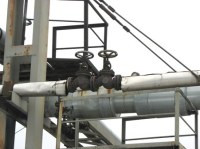How to make the best of EU’s energy policy?
After the January gas crisis the issue of energy security and gas supply is increasingly discussed in Bulgaria. The country has very energy inefficient economy and is almost 100% dependent on Russian gas imports. This is why the question about Bulgaria’ s participation in the big energy projects is every more relevant. Solving the energy security issues in Bulgaria depends on solving them at European scale. The mega projects Nabucco and South Stream are often mentioned as saviors of EU’s energy security, but they are too expensive and hard to come about politically. Besides, these projects are all about pipes, but not about developing of gas sources and effective distribution. Instead, the EU needs Single Energy Policy and an Energy Regulatory Agency to diced about gas imports, exports and transit at EU-wide level. This is the shortest way to deliver more energy security and to optimize consumption and reserves.
 EU’s problems today are not pipelines. They are the following: 1) Huge dependency on Russia (42% of gas imports) and 2) disproportional energy diversification between Eastern and Western Europe. While the dependency on Russia decreases with improvements in renewables and energy efficiency, the second problem remains. It has direct consequences mainly for the new member states, but also creates costs for the old ones. The proper way to address this challenge is to build the necessary interconnection between national gas infrastructures and to create a single regulatory mechanism at community level. Such a mechanism would be responsible for the import and export of gas from country to country and would gather information about the supply, storage, production capacity and consumption needs. In this way with an integrated regulation mechanism would create both political and economic benefits.
EU’s problems today are not pipelines. They are the following: 1) Huge dependency on Russia (42% of gas imports) and 2) disproportional energy diversification between Eastern and Western Europe. While the dependency on Russia decreases with improvements in renewables and energy efficiency, the second problem remains. It has direct consequences mainly for the new member states, but also creates costs for the old ones. The proper way to address this challenge is to build the necessary interconnection between national gas infrastructures and to create a single regulatory mechanism at community level. Such a mechanism would be responsible for the import and export of gas from country to country and would gather information about the supply, storage, production capacity and consumption needs. In this way with an integrated regulation mechanism would create both political and economic benefits.
Besides having political and economic advantages, liberalizing EU’s energy market improves the Europe’s security. First, the national deficiencies would become European, which will facilitate common positions in energy and foreign policy. Second, the gas security increases in the whole EU because in case of deficiency in one member state, others can easily redirect gas flow. While this is particularly good for the new member states, it also brings political dividend for the old ones because Third: the gas issue would be depoliticized and Russia would not be able to build coalitions in the EU thus splitting the Union in different camps. At this moment this is the biggest weakness of the EU. If this changes though internal integration instruments, it would significantly enhance EU’s standing in the international scene.

Nature knows how to connect important part of one. Do we?
The Fourth reason for market liberalization and community regulation is that if the EU does this successfully, it will give a very good reference point for the rest of the world. This can be of key importance in the long-run as most of the energy-exporting countries have state-owned energy sectors. This is the case with Russia too, whose energy market is functioning thanks to costly government support. With the artificially low domestic prices no one sees a reason to invest in energy efficiency. This leads to great loses. As a result Gazprom gets 100% of its profits from only 25% of the gas it sells – the one that it exports. Furthermore, the Russian state monopoly strongly discourages the opportunities for investments, developing new gas sources and improving the infrastructure. According to the international Energy Agency, Russia should invest around 11 billion USD for maintenance and development of its transport infrastructure. This money is mainly used now for consultancy and new pipelines, while development is totally neglected. Today Russia invests more in the Sochi Olympic Games than in its energy sector. This may create the ironical situation where the richest country in gas will not be out of gas and will not export the contracted amounts.
In fact, we had such a case in winter 2005/6. If we want to avoid that from happening again, we should work for liberalization of energy markets and start from our own! This would smooth the progress of energy efficiency and stronger foreign policy positions. Furthermore, this would not require the huge investments of Nabucco and South Stream. What it requires is political will. If the supporters of a Single Energy policy lose the fight with the lobbies of the construction companies and the bureaucratic dreams, the EU would miss a golden opportunity to make a major step in solving its energy problems.
Liberalization is thus where we should start from. Then diversification of routes and sources would be the cherry of the energy security pie. It will do good to energy security and economy if the new pipelines are carefully thought of. Now they are not. And this makes it even more obligatory to act smart.